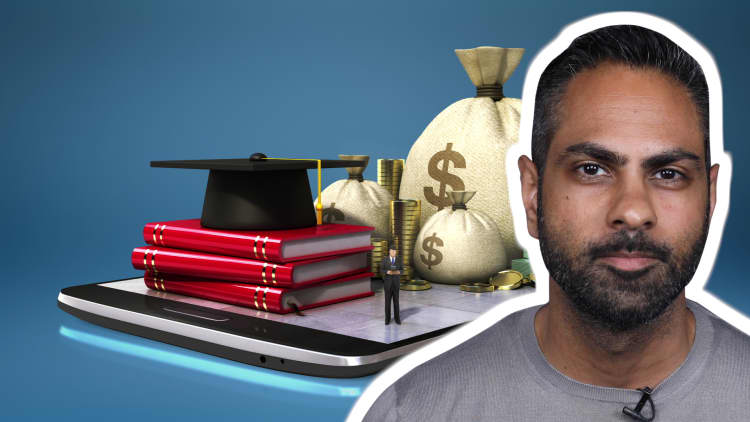Billionaire CEO Robert F. Smith announced on Sunday he planned to set up a grant to pay off recent Morehouse College graduates' student loans. But while the generous gift helps the nearly 400 seniors who graduated this weekend from the historically black college in Atlanta, other students around the country may be facing a much more difficult repayment route.
Over half of young adults have student loan debt. And 36% of college graduates paying off student loans say now that taking on that debt wasn't worth it, according to a new report by Merrill Lynch and Age Wave, which surveyed over 2,700 early adults (defined here as those ages 18 to 34).
A smaller poll by GoBankingRates recently arrived at similar conclusions: It found that, while a vast majority of Americans with college degrees don't regret college itself, many do say the student debt they incurred wasn't worth it.
That's because the high cost of a degree can cause financial hardships for graduates trying to build their life after college: It can even force them to delay major life milestones, such as buying a house and starting a family.
Still, experts say that gaining a college education is often a smart choice in the long run, even if you need to take out student loans to pay for it. And research backs them up.
The high cost of student loan debt
The total student debt in the U.S. is over $1.5 trillion, and 2017 graduates who took out loans to attend college have an average of $28,650 in debt each, according to the most recent report on student loan borrowing from the Institute for College Access & Success.
The average American aged 18 to 34 carries a student loan balance of $36,888, according to Age Wave's calculations of data provided by the Federal Student Aid Office of the U.S. Department of Labor.
It's likely that this year's graduating seniors will allocate up to 9% of their pre-tax salary to loan repayments, which averages out to $371 a month for the next 10 years. That's assuming they earn around $50,000, which is the average starting salary among graduates from the class of 2018, as calculated by the National Association of Colleges and Employers (NACE).
Those figures have prompted some, like Reddit co-founder Alexis Ohanian, to question whether college is worth the expense. Others have gone even further: Author James Altucher has said that, in many cases, "a degree means nothing," and self-made millionaire Grant Cardone has declared that "most people should not be going to college."

Most experts say college is worth the loans
Experts generally point out that there's still value in a college diploma, and it increases over time. In fact, Pew Research Center recently found that there's a "sharp divide" between the financial situations of those who have a college education and those who stop their education before getting a degree.
Ramit Sethi, author of "I Will Teach You to be Rich," says that taking out student loans to pay for college can be a good long-term bet on your future. "I want to encourage everyone here to not just take advice from a bunch of people on Twitter who are telling you, 'Drop out of college — student loans are bad,'" he says.
Student loans are generally seen as a "good" kind of debt, because they serve a purpose and can lead to higher earning potential in the future. You can view student loans as a low-interest investment in your future compensation, Virginia-based financial planner Nicole Theisen Strbich tells CNBC Make It.
And many students take out a responsible amount of debt. Again, the average balance for those 18 to 34 is under $37,000, which may seem like a lot; but that's still what experts consider an acceptable level.
"Given the modest levels of student debt that the typical millennial grad is taking on, it still looks like college is working out pretty well for them," Richard Fry, a senior researcher at Pew Research Center, tells CNBC Make It.
Pew's research found a notably large gap in earnings between millennials (defined here as ages 23 to 38) with different levels of education. Last year, millennials with at least a bachelor's degree earned a median annual salary of $56,000, Pew found. Yet millennial workers who did not complete college reported making a median of $36,000 per year.
Given the modest levels of student debt that the typical millennial grad is taking on, it still looks like college is working out pretty well for themRichard Frysenior researcher at Pew Research Center
"For the average millennial grads, relative to their counterparts who stopped their education in high school, they tend to do much, much better," Fry says. And those with at least a bachelor's degree will continue to receive those gains throughout the next two to three decades of their working life.
Recent data from the U.S. Census Bureau showed similar findings. Americans of all ages with a college degree reported earning $65,482 on average in 2016. Those with only a high school diploma earned an average of just $35,615.
In fact, studies show that those with a bachelor's degree are projected to make an average of $1 million more in their lifetimes than those without one. Plus, college graduates are only half as likely to experience unemployment as their peers with only a high school diploma.
It may take a while for the benefits of a degree to kick in, though. And, since life, and your career, can be unpredictable, don't borrow recklessly: "I'm not saying everyone should graduate with $150,000 in student loan debt," Sethi says. "Don't do that."
In the end, it's about finding a college that works for you and your budget. But remember that taking out student loans to get your degree shouldn't automatically be seen as a negative. "Don't buy the typical advice that everyone seems to be throwing around these days saying college loans are the worst thing on earth. They're not," Sethi says.
Like this story? Like CNBC Make It on Facebook!
Don't miss: Self-made millionaire to parents: Don't pay for your kid's college education



